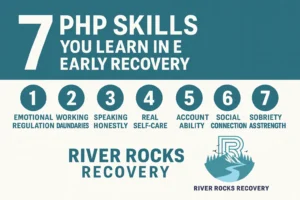When you’re newly sober and still trying to figure out who the hell you are without substances, walking into a Partial Hospitalization Program (PHP) can feel… weird. Especially if you’re young. Especially if your friends are still out partying like nothing ever touched them.
But here’s the plot twist: while they’re perfecting their hangover routines, you’re out here learning how to actually live your life. Sober. Awake. Accountable. Yeah, it’s not glamorous—but it’s real. And the skills you pick up at a place like River Rocks Recovery’s Partial Hospitalization Program in Middletown, Ohio are the kind of tools people spend decades trying to figure out in therapy (if they ever get there).
This isn’t about “beating addiction.” It’s about building a life that feels good enough you don’t want to escape it.
1. Emotional Regulation (AKA Not Freaking Out Every Time Life Is Hard)
Let’s be honest—if you’re in recovery, there’s a decent chance you didn’t exactly grow up with the healthiest toolkit for handling emotions. Rage? Suppress. Sadness? Drink. Anxiety? Avoid. In PHP, that all starts to shift.
You learn to spot the wave before it crashes. You learn the difference between reacting and responding. And more importantly, you learn you’re not a terrible person for having big feelings—you just never got a manual before. PHP gives you that manual, and it’s written in real-life, no-BS terms.
2. Boundaries That Actually Work (Even With Friends Who “Don’t Get It”)
Saying no isn’t selfish. Protecting your peace isn’t overreacting. In PHP, boundaries aren’t just a lesson—they’re a lifestyle.
Whether it’s telling your ex you’re not ready to hang out, or choosing to skip that party everyone swears will be “chill,” you’ll start realizing that boundaries are how you stay sober—and sane. You’ll practice them in group, in therapy, and in the awkward in-betweens where you’re learning to advocate for yourself without needing approval.
3. Speaking Honestly—Even When It’s Uncomfortable
Early recovery feels like emotional puberty. Everything’s raw, awkward, and new. PHP gives you a space to practice saying the truth—even if your voice shakes. Whether it’s “I’m angry,” or “I feel numb,” or “I miss getting high,” it all gets to exist.
And guess what? The more you say the hard stuff out loud, the less power it has. The less ashamed you feel. The more real your relationships become—because you’re not just performing anymore.

4. What Real Self-Care Looks Like
No shade to bubble baths and candles, but PHP shows you what real self-care actually is: sleeping 7+ hours a night. Drinking water. Eating actual food at actual meal times. Not ghosting your therapist. Saying no to chaos, even when it’s familiar.
Self-care in PHP is survival, not luxury. It’s rebuilding your nervous system after years of stress and substances. And over time, those routines stop feeling like rules and start feeling like support.
5. Accountability That Doesn’t Involve Shame Spirals
Here’s something no one tells you: it’s okay to mess up in recovery. The key is what you do next. PHP teaches you how to be accountable without trashing yourself in the process.
Maybe you showed up late to group. Maybe you snapped at your roommate. Maybe you thought about using. Instead of pretending it didn’t happen—or beating yourself up—you learn how to say: “That was real. I own it. Here’s what I’m doing about it.”
That’s adulthood. That’s growth.
6. How to Be Around People Without Performing
One of the hardest things in early recovery? Being in a room with other people without your usual mask on.
PHP isn’t just group therapy—it’s social rehab. You learn how to listen without fixing. How to sit in silence without filling it. How to support someone without sacrificing yourself. It’s weird at first, especially if your old relationships were built on trauma bonding or substance use. But stick with it, and you’ll start to notice something powerful: connection that doesn’t come with a hangover.
7. Seeing Sobriety as Strength, Not a Sentence
At first, being the sober one can feel like being the weird one. Like you’re the only person in your friend group who has to second-guess brunch.
But as you work through your Partial Hospitalization Program, something shifts. You stop seeing your sobriety as a limitation—and start seeing it as a superpower. You realize you’re building emotional muscles most people haven’t even touched. You realize you’re not behind—you’re ahead.
Sobriety stops being a secret shame and starts being a quiet flex.
Bonus: You Learn You’re Not Alone (Even If It Still Feels That Way Sometimes)
If you’re coming from Monroe or West Chester, and you’re scared to start, that’s normal. Walking into treatment—especially PHP—can feel like walking into the deep end.
But every person in that room has felt awkward, out of place, and unsure at some point. The group might not look like your college friends. But they’ll probably be the ones who cheer you on the loudest when you make it through the week.
FAQ: What Young People Ask About PHP
What exactly is a Partial Hospitalization Program?
A PHP is a structured, intensive level of care where you attend therapy and group sessions for several hours a day, multiple days a week—but you still sleep at home or in a sober living environment. It’s a middle ground between inpatient and outpatient care.
Do I have to stay in a hospital or live somewhere else?
Nope. Despite the name, there’s no overnight stay required. At River Rocks Recovery in Middletown, Ohio, PHP clients return home each evening or live in supportive housing nearby.
Is PHP only for people who’ve hit “rock bottom”?
Absolutely not. PHP is for anyone who needs more support than once-a-week therapy can provide. That includes young adults navigating early recovery, people leaving inpatient care, or folks struggling with mental health alongside substance use.
Can I work or go to school while in PHP?
It depends on your schedule and energy levels. PHP is a big time commitment—usually 5–6 hours a day, 5 days a week. Some people take a break from work or school to fully focus on healing, while others find flexible ways to juggle both.
How long does PHP last?
Everyone’s timeline is different. Some people are in PHP for a few weeks, others for a couple of months. The goal is to give you enough support to stabilize and build tools before transitioning to a lower level of care like IOP.
Will I still feel weird being sober after PHP?
Maybe. But you’ll have tools, support, and a stronger sense of self. You won’t be white-knuckling it alone. And feeling weird isn’t the same as being wrong. You’re doing something brave—not something broken.
Ready to build real skills, not just survive?
Call (888) 905-6281 or visit to learn more about our Partial Hospitalization Program in Middletown, Ohio. If you’re feeling like the odd one out—maybe this is the place where you’ll finally feel understood.




























